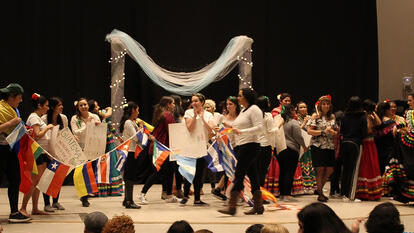Women Scholars at Wellesley Weigh In on World Issues

Wellesley’s women faculty and fellows are popular media sources for informed insight on global topics. Three Wellesley experts have spoken recently on issues that span the world, from Iran to Puerto Rico to North Korea.
Delaram Farzaneh, a visiting fellow of the the Freedom Project at Wellesley, wrote a recent piece for the Freedom Project’s blog entitled “An Assault on Peaceful Protest in Iran: The Girl on Enghelab Street." In it, she tells the story of a young woman’s protest, one of many, in late December 2017 against laws that make wearing the hijab compulsory only for women in Iran. This is a continuation of social movement to remove gender-based discriminatory laws against women. (Video of the young woman’s protest went viral.)
“When women’s rights and freedoms are decided in Iran only according to ‘Islamic criteria,’ that in practice are restrictive and discriminatory against women, any protest or expression to challenge them are per se found un-Islamic and ‘influenced by western views,’” Farzaneh wrote.
Farzaneh has studied and written about international human rights and women’s rights in Iran and is the author of Judgeships in Iran: Step Down, You are a Woman—A Legal Analysis of International Human Rights.
Assistant Professor of American Studies Petra Rivera-Rideau is an expert in cultural politics of race in Latin American and Latina/o communities. Her book Remixing Reggaetón: The Cultural Politics of Race in Puerto Rico examines Puerto Rico’s relationship to the African Diaspora through the lens of reggaetón music.
Recently, NPR’s Felix Contreras, host of the program Alt.Latino, interviewed Rivera-Rideau about her perspective on the portrayal of women in reggaetón music. Though reggaetón features a throbbing beat and sexually explicit lyrics, which some critics interpret as offensive, Rivera-Rideau argued that critical commentary should be contextualized.
Criticism, Rivera-Rideau said, “is used to not only discredit reggaetón but in my opinion to demonize a lot of the communities where reggaetón comes from,” which she said are historically nonwhite, urban communities that have been “subject to structural racism and disenfranchisement.”
Katharine Moon, professor of political science and Edith Stix Wasserman Chair of Asian Studies, is a sought-after expert on the global politics at stake on the Korean peninsula. Her recent media appearances include NPR’s On Point, where she discussed the possibility of high-level talks between the U.S. and North Korea, a topic she also debated as a guest on WGBH’s Greater Boston. She has also been a guest on C-SPAN’s Washington Journal program, regarding geopolitics at the Olympics, and she recently spoke to the New York Times Magazine about South Korea’s aging population.
Moon is a nonresident senior fellow at the Brookings Institution Center for East Asia Policy, was the inaugural holder of the SK-Korea Foundation Chair in Korea Studies (2014–2016), and is an associate in research at Harvard University’s Korea Institute. She is also an expert in women’s issues and gender politics.
Photo: The Girl of Enghelab – or “Revolution” – Street stands on top of a utilities box, waiving a headscarf hanging on a stick at a protest in Tehran, Iran on December 27, 2017. She has become a symbol of the protest against the mandatory hijab rules in Iran and is the topic of Delaram Farzaneh’s Freedom Project blog post.



